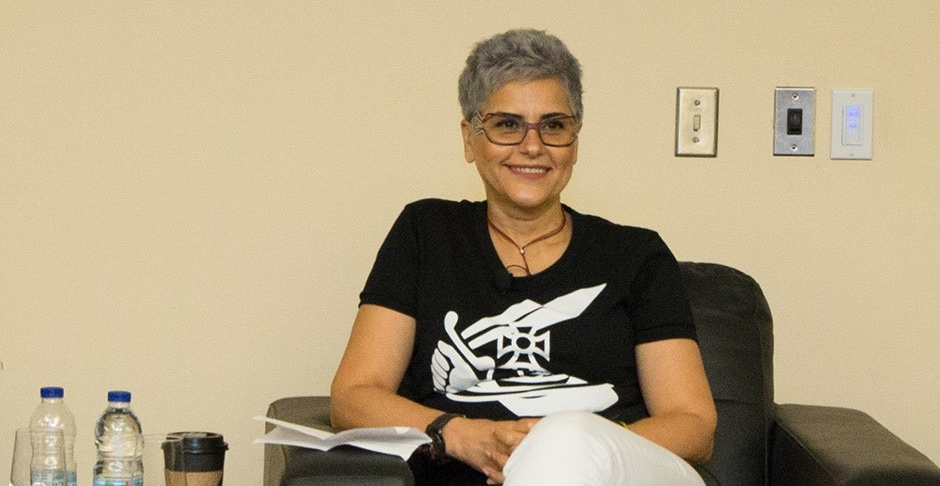Engineering grad develops world’s first anonymized infection-tracing app
As cities across the country begin to reopen, many health professionals are stressing the importance of contact tracing to help monitor individuals who have come in close contact with someone infected with COVID-19.
Experts are correspondingly racing to develop innovative consumer applications. In May, for example, the province of Alberta launched ABTraceTogether.
There are data privacy concerns with such technologies, however, warns Fay Arjomandi, BEng 98, the 2018 alumna of the year.
“The way contact tracing with Bluetooth technology works is that your tracing data ends up on my device and my data ends up on your device,” explains the co-founder and CEO of Vancouver-based software company mimik.
“So if I go to a doctor and find out I have the virus, they can access my device with my permission to extract all the other users’ information. Then, the doctor can call all those I have been in contact with to inform them they may have been exposed. Which means that at that time, their information is exposed to health authorities without their permission.”
‘Data privacy is near and dear to our hearts’
Mimik has pioneered hybrid edge-cloud technology and Internet decentralization in order to significantly improve data privacy, reduce cloud infrastructure costs, radically improve real-time interactions and provide access to rural communities in an eco-friendly manner.
Concerned for people’s privacy and well-being, Arjomandi and her team have developed their own app, Pandimik. They hope to make it widely available soon to consumers, universities and businesses.
Pandimik was built using a software-only platform that puts users in complete control of their data and ensures that nothing is shared without their real-time consent.
“Many ideas have been floated on contact tracing, requiring the use of tracking people’s location and monitoring their every move,” says Arjomandi. “This worries us because data privacy is near and dear to our hearts.
“We realized that our underlying platform — which enables devices to discover each other and communicate while the data remains on the device — was perfect for contact tracing. With Pandimik, your tracing data remains on your device and in your control. You can decide who can see it and for how long. The broadcast of any information to other devices is controlled by you and directly from your own device, but with a centralised oversight to prevent the broadcast of false information.”
 Arjomandi was a guest speaker at the Gina Cody School Distinguished Alumni Lecture Series in 2018.
Arjomandi was a guest speaker at the Gina Cody School Distinguished Alumni Lecture Series in 2018.
Starting from the premise that the app must have what Arjomandi calls a “triple-A rating” (anonymity, adoption and adaption), Pandimik will allow users to have their COVID-19 test results sent straight to their smart device.
If someone receives a positive result, they will be able to send an alert — first vetted by health authorities to prevent fakes — to all devices that have been in close contact, without sharing any personal or identifying information to any third parties.
Ideally, Pandimik will also act as a resource centre by providing advice, education and referrals for users who have tested positive. But first, the company needs a health or government agency to sponsor it. Arjomandi addressed Canada’s Standing Committee on Industry, Science and Technology in May and is awaiting a response.
‘Constantly adapt’
As a political refugee, immigrant and woman in a male-dominated field, Arjomandi has faced her share of adversity. In a way, this has prepared her to manage the hardships of the current moment.
“I’ve had a life full of turmoil,” she says. “I was in grade five when the Islamic Revolution happened in Iran. I was in grade six when the war between Iran and Iraq started. I was in grade seven when I told a joke about the new Islamic government in Iran and got into trouble with law enforcement. I had to escape the country when I was 17.”
When Arjomandi arrived in Montreal aged 23, she decided to enrol in the Department of Electrical and Computer Engineering at Concordia. She completed her bachelor’s degree in two years.
Three lessons acquired along the way have particular relevance for today’s cohort of students, Arjomandi says.
“One, you’ve been given an opportunity to learn, so it’s up to you to take advantage of it. Two, always focus on the outcome and impact of your activities. And three, don’t make rigid assumptions about the future — constantly adapt and find ways to overcome challenges and achieve your goals.”